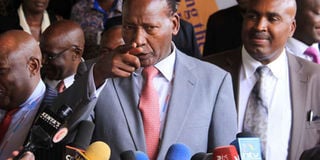Terrorist attacks bring security back to national agenda

Interior Cabinet Secretary Joseph Nkaissery addresses the media during the International Conference on Peace, Security and Social Enterprise at Safari Park Hotel on May 17, 2017. Security should be a national priority. PHOTO | JEFF ANGOTE | NATIO MEDIA GROUP
What you need to know:
- President Uhuru Kenyatta amplified Kenya’s role as a frontline state in the international war against global terrorism.
- The upsurge of terrorist attacks will have a direct bearing on national security policies.
The sudden upsurge in terrorist attacks after a prolonged lull sends worrying signals just two months to the General Election.
The deaths of 20 people, including 11 police officers, in a spate of landmine attacks and shooting sin Garissa and Mandera counties came just as the Inspector-General of Police issued a terror alert following what he said was increased infiltration from Somalia by Al-Shabaab militants.
Yet, until recently, government officials were exuding confidence that a lull in terrorist incidents over the past year was the fruit of successful security operations against Al-Shabaab in Kenya, and also across the border in Somalia where the Kenya Defence Forces is active in an African Union military mission trying to pacify the militants.
AMISOM
Just two months ago, in his annual State of the Nation address in Parliament, President Uhuru Kenyatta amplified Kenya’s role as a frontline state in the international war against global terrorism.
He reiterated Kenya’s resolve to stay the course in pursuit of Al-Shabaab in its lairs within Somalia.
“We have robbed the enemy of territory, resources and control over people … we know that if we fight the enemy in Somalia, we won’t have to fight them here at home,” he said.
He pointed out that the military mission in Somalia had yielded significant success and degraded Al-Shabaab capacity to carry out large-scale attacks in Kenya and elsewhere.
RECALL KDF TROOPS
This message might have been necessary in light of growing disquiet over the cost, in fallen soldiers and in monetary terms, on the Somalia mission.
The Jubilee administration has signalled on many occasions since the President’s speech that there would be no pulling out of Somalia until the objective of defeating Al-Shabaab was achieved, and the Somali Government attained capacity to secure its own territory.
This position is at odds with the line pushed by opposition leaders Raila Odinga and his presidential running mate Kalonzo Musyoka, who have been stating even before the latest attacks that they would recall Kenyan troops from Somalia.
Although their newly formed National Super Alliance (Nasa), an expansion of the Cord alliance on which they fought the last General Election, has yet to issue any policy papers, chances are the position previously enunciated by Mr Odinga and others on withdrawal from Somalia will be adopted.
PREVENT INCURSIONS
Ironically, Mr Odinga, Mr Musyoka and another Nasa co-principal, Senate Minority leader Moses Wetang’ula, were key officials in government when the Somalia mission was first mooted.
Mr Odinga as prime minister and Mr Wetang’ula as Foreign minister, were involved in lobbying the United States, Britain, and other Western allies to support what was then an independent operation nick-named Operation Linda Nchi, before it became part of the African Union mission.
But positions changed once they were out of government.
Mr Odinga explained in an interview with this newspaper that he supported the original mission, which was to secure a length of territory on the Kenya-Somalia border in order to stem terrorist incursions.
CAPITULATION
But the nature of the operation had changed, he said, extending to occupation of a large swathe of southern Somalia with no clear objective or exit strategy.
He charged that the mission had failed anyway, because Al-Shabaab had not been eliminated, but had actually grown stronger.
Al-Shabaab actually has been demanding withdrawal of Kenyan troops from Somalia and using that as justification for its attacks, but that raises the question whether pulling out would not be surrendering to threats from the terrorist group.
There is also the question of whether withdrawal would satisfy the terrorists and make them stop their attacks; or embolden them into a more fierce war.
SECURITY POLICIES
With elections around the corner, these are the issues that will be of concern to most Kenyans who have justifiable cause for concern.
The upsurge of terrorist attacks will have a direct bearing on national security policies pursued by different political players, especially on the issue of whether Kenyan troops should remain in Somalia or they should be withdrawn.
It is not yet clear why Al-Shabaab has suddenly increased activity in Kenya, but Interior minister Joseph Nkaissery and police chief Joseph Boinnet both attribute the recent attacks, ironically, to successes by the Kenya mission in Somalia.
The argument is that the terrorists have been hit hard and many of their bases and camps destroyed, forcing them to scatter into smaller disorganised groups that are trying to demonstrate they are still active.
EMASCULATING SHABAAB
A counter-terrorism official who spoke to the Nation on condition of anonymity agreed with this view, but added that increased US support for the Amisom troops significantly disrupted Al-Shabaab and eliminated a significant number of key leaders.
The other factor is the onset of the Muslim holy month of Ramadhan, the officer said, pointing to historical data suggesting that terrorist groups tend to scale up activity during the period.
It is then ironical that it is during this period that President Kenyatta on campaign forays into some Muslim-dominated and also insecurity-prone areas, the latest being Lamu County on Wednesday, is announcing relaxation of security curfews.
PRIORITY
The officer explained that lifting the night curfews also comes with enhanced security presence.
Some might argue, however, that the gestures are driven more by base political campaigns rather than altruistic motives.
Whatever the case, the recent incidents might serve to push national security back to the top of the national agenda in the run up to elections.
Email: [email protected] Twitter: @MachariaGaitho





